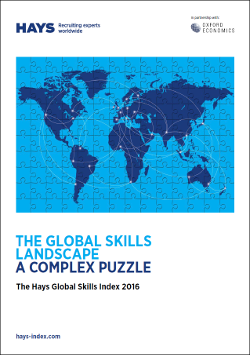Ungated Post | 21 Sep 2016
The Hays Global Skills Index 2016

Skills shortages and skills mismatches are worrying issues for businesses. When employers find it difficult to recruit the people with the skills they need, there are real costs. These may be lost business, reduced productivity or a need to undertake additional training to upskill people. There are also implications for the workload and welfare of existing staff with increasing pressure to meet growing demand.
The Hays Global Skills Index helps to identify where there are skills shortages, or too great a skill pool for the jobs available and also looks at the effect this has on wages in the 33 countries in which the company operates. Developed jointly by Hays plc and Oxford Economics, the analysis investigates how the global skilled labour market has changed since 2015, drawing from labour market data and Hays in country recruitment experts’ experience in the market. As this is the fifth year of the Index, the report also looks at how things have changed since 2012 to take a longer-term view of developments across the global labour market.
For more information please click here .
To view the report, please click here.
Oxford Economics’ team is expert at applying advanced economic tools that provide valuable insights into today’s most pressing business, financial, and policy issues.
To find out more about our capabilities, contact:
Americas
Diantha Redd
+1 (646) 503 3052
Email
Asia Pacific
Peter Suomi
+65 6850 0110
Email
EMEA
Aoife Pearson
+44 (0)203 910 8054
Email
Related Services

Post
The economic impact of abandoning the WTO
Oxford Economics have been commissioned by the International Chamber of Commerce (ICC) to provide an independent assessment of the economic impact of WTO dissolution. This report details our findings and the assumptions underpinning our analysis.
Find Out More
Post
The economic impact of the sports activities of public service media
This study shows how the sports activities of public service media supported €4.5 billion of GDP and 57,000 jobs across 31 European countries in 2022. The report also highlights wider economic benefits of public service media sports coverage, such as the way in which it leverages sponsorship income for sports bodies.
Find Out More
Post
Global Trade Education: The role of private philanthropy
Global trade can amplify economic development and poverty alleviation. Capable leaders are required to put in place enabling conditions for trade, but currently these skills are underprovided in developing countries. For philanthropists, investing in trade leadership talent through graduate-level scholarships is an opportunity to make meaningful contributions that can multiply and sustain global economic development.
Find Out More